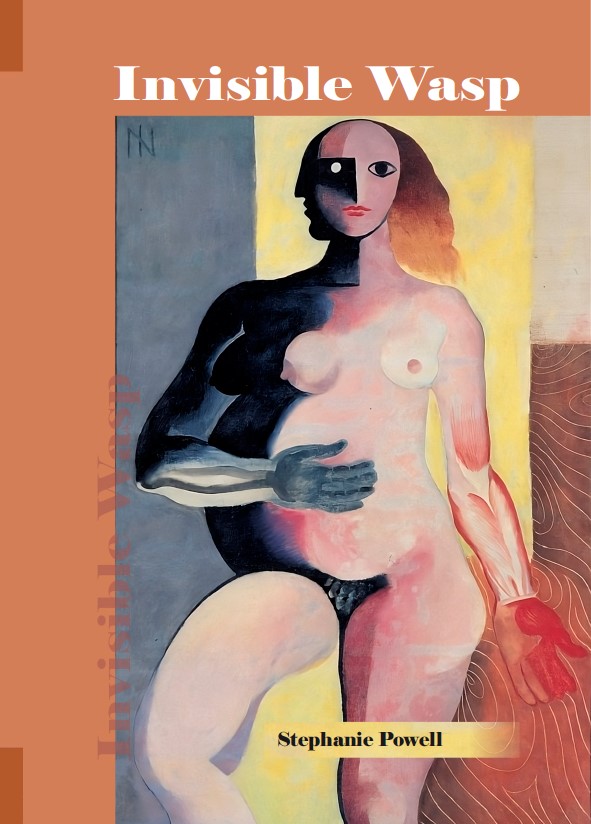 Reviewed by Beatriz Copello
Reviewed by Beatriz Copello
Invisible Wasp
by Stephanie Powell
Liquid Amber Press
88pp, softcover, ISBN: 9780645713183, Sept 2024
Stephanie Powell is an award-winning poet, her poetry has been published in literary journals and anthologies, Invisible Wasp is her third published book of poetry.
It is not everyday day that a book of poetry surprises me like Invisible Wasp. The book contains many elements outside poetry conventions. The themes are varied, moving from the surreal to the tangible, from the spiritual to the everyday, and from the natural world to the imagined. It is very entertaining to read. With a mixture of sophisticated and casual language, concrete and poetic words, Powell creates realistic settings that conjur the day-to-day, sleepwalking, shopping or opening an envelope.
The styles and settings of the poetry are also unusual. Powell’s poems are presented in many different ways from long paragraphs to short ones, couplets, standard and nonstandard punctuation. These are poems that engage with ordinary moments in life, depicted in condensed language, for example the dread of getting up in one of those days when everything requires an effort: “too bold the morning to be faced just yet.”
“Cruel acts” in the imagination are also a feature of this collection, as in the following poem:
Starting with the swallow
nodes of its mouth buckling
and flexing
the whole summer inside
Smaller than an eyelash
I steal its tongue
bird gags on the
new architecture of its throat
The list of thefts continue:
pink lump (heron)
blood spike (crow)
(pelican) mollusc
Cigarette-ash (pigeon) —
so many seasons
held sacred in muscle
In mute cul-de-sacs
I keep the faith
my pockets filled
by small acts of cruelty (“Thief”)
This poem deals with the theme of theft, cruelty and the transformation of the natural world. As with many of Powell’s poems the imagery is strikingly visceral, beginning with the swallow’s mouth, as if the act of theft distorts the essential order. The symbolic description of cruel acts not only draws from the activity of birds but also the essence of life they represent. The cruelty appears to be a ritualistic aspect to theft, like an act of faith.
Many of the poems in Invisible Wasp explore themes of stagnation, memory and the passage of time, evoking a sense of abandonment while also celebrating persistence and resilience. Many of these poems are contemplative pieces with an undercurrent of melancholy that reflects on missed opportunities and the weight of time.
Invisible Wasp explores issues associated with being a female themes such as ovulation, pregnancy, fertility, being childless and the indignity of some medical procedures. Something that I like very much is that in many poems is the way Powell utilises everyday language to describe acts and feelings which gives the work a strong verisimilitude:
Feeling sexy
but the garden needs weeding and I am pulling up bastard clovers, thistle.
Feeling sexy in the bath too small for both of us and I can hear you making dinner, talking to the dog.
Feeling sexy? Bending over to scoop up my knickers, rolls
of stomach like cloud on thighs.
Nipples touching my knees, one heel raised in an awkward
dance as you are watching by the
doorway anyway
are we feeling sexy? (“Feeling sexy”)
There is a surprise in every poem in Invisible Wasp. The poems could be idealistic or pragmatic, or about desires or disappointments, or personal or about the natural world or even imaginary events, but they are always a delight to read.
About the reviewer: Dr Beatriz Copello is an award-winning poet, she writes poetry, fiction, reviews and plays. The author’s books are: Women Souls and Shadows, Meditations At the Edge of a Dream, Under the Gums Long Shade, Forbidden Steps Under the Wisteria, A Call to the Stars translated and published in China and Taiwan, Witches Women and Words, No Salami Fairy Bread, Rambles, Renacer en Azul and Lo Irrevocable del Halcon (In Spanish). Copello’s poetry has been published in literary journals such as Southerly and Australian Women’s Book Review and in many feminist publications. The author has participated in international conferences, has taught Creative Writing at W.S.U. and other scholarly institutions, she has read her poetry at Writers Festivals and other poetry events in Australia and overseas. Copello is mentioned amongst the forty “most notable people” graduated from the University of Technology.